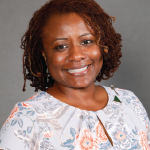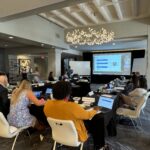 The ARP Nominations & Appointments Committee plays a pivotal role in overseeing the nominations process, ensuring the election and appointment of qualified leaders and volunteers who reflect the diverse membership of ARP. Together with the ACR’s Marketing & Communications Department, we kick off the 2025 term by promoting the annual Call for Volunteers and identifying areas with volunteer openings within ARP. We then carefully review all volunteer applications to ensure the most qualified candidates are selected for each position. Although we strive to assign volunteers to the positions they request, our commitment to enhancing diversity-thereby amplifying the representation of our membership-may sometimes lead us to recommend alternative volunteer roles to candidates.
The ARP Nominations & Appointments Committee plays a pivotal role in overseeing the nominations process, ensuring the election and appointment of qualified leaders and volunteers who reflect the diverse membership of ARP. Together with the ACR’s Marketing & Communications Department, we kick off the 2025 term by promoting the annual Call for Volunteers and identifying areas with volunteer openings within ARP. We then carefully review all volunteer applications to ensure the most qualified candidates are selected for each position. Although we strive to assign volunteers to the positions they request, our commitment to enhancing diversity-thereby amplifying the representation of our membership-may sometimes lead us to recommend alternative volunteer roles to candidates.
What distinguishes this committee from others? Here are a few key points:
- The committee chairperson role is automatically filled by the ARP’s immediate past president;
- Conflict-of-interest considerations rarely revolve around financial issues. Instead, they primarily focus on personal relationships between committee members and volunteer applicants;
- Committee members must remain mindful of biases because these can influence appointment decisions and impact the success of the College as a whole; and
- Committee members become knowledgeable in using specific software programs, such as Confluence and OpenWater.
The Committee
The Nominations & Appointments Committee includes three of the four ARP officers: the past president, the president and the secretary. Each officer has prior leadership experience and is well-versed in the College’s current membership, operational priorities and strategic initiatives. This knowledge allows the committee to better identify gaps in the composition of the ARP, ACR and Rheumatology Research Foundation committees, fostering informed decisions when appointing new volunteers.
 Kori Dewing, DNP, ANP-BC, ARNP (ARP president 2022–23), says, “I think what was most fascinating to me was to see how beautifully, with applications representing such a diverse and passionate cohort of rheumatology professionals, we were able to fit the puzzle pieces together and shape committees that do so much good work. Year after year, we somehow find that secret sauce for success.”
Kori Dewing, DNP, ANP-BC, ARNP (ARP president 2022–23), says, “I think what was most fascinating to me was to see how beautifully, with applications representing such a diverse and passionate cohort of rheumatology professionals, we were able to fit the puzzle pieces together and shape committees that do so much good work. Year after year, we somehow find that secret sauce for success.”
 Barbara A. Slusher, MSW, PA-C, DFAAPA, DipACLM (ARP president 2021–22), says, “The best part of ARP nominations is observing firsthand the richness of diversity, talent, skillfulness, intelligence, knowledge and experience of our members. Volunteers are the engine of the ARP, and it is an honor as a Nominations Committee member to match member’s talents to the best volunteer experience. In the end, the committee’s role is to ensure the future success of the organization that supports us in doing what we do best in our specialty/profession.”
Barbara A. Slusher, MSW, PA-C, DFAAPA, DipACLM (ARP president 2021–22), says, “The best part of ARP nominations is observing firsthand the richness of diversity, talent, skillfulness, intelligence, knowledge and experience of our members. Volunteers are the engine of the ARP, and it is an honor as a Nominations Committee member to match member’s talents to the best volunteer experience. In the end, the committee’s role is to ensure the future success of the organization that supports us in doing what we do best in our specialty/profession.”
Additionally, the committee includes three ARP members and one representative from the ACR, each serving three-year terms. Together, the committee is well equipped to ensure the best volunteer appointments for the College.


